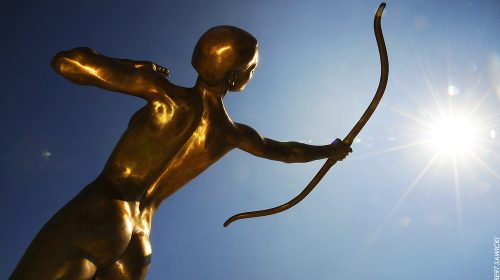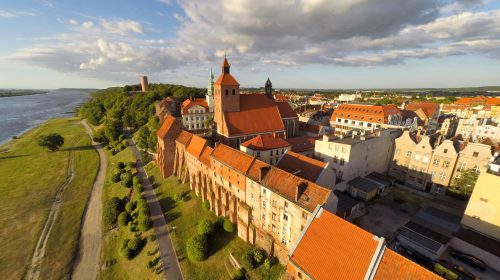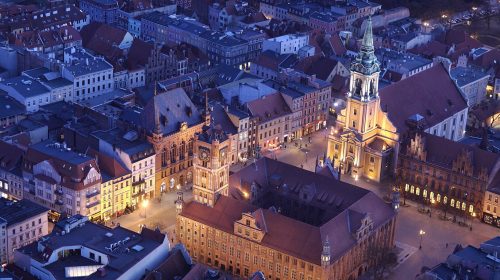He was born on 29th March 1920, in the Szwederowo district of Bydgoszcz. He was a theatre and film actor, theatre director, and an activist of culture. His name was given to the Polish Theatre in Bydgoszcz.
During his young years in Bydgoszcz, he first attended the State Classical Grammar School located at pl. Wolności – that building was later transformed into Secondary School No. 1. Later on, Hieronim Konieczka, born into a family of merchants, started education at a merchant training school. In 1936, Hieronim Konieczka started working at the Department Store of the Małeccy Brothers in Bydgoszcz. During the German occupation of the city, he was taken away to perform forced labour in Elbląg and Grudziądz.
After the Second World War, Hieronim Konieczka started acting education at the Drama School in Bydgoszcz, founded at the initiative of Aleksander Rodziewicz, who was then director of the Municipal Theatre of Bydgoszcz. He completed his acting education in 1946 and passed a state exam, in front of an examination board at the Leon Schiller National Film School chaired by Leon Schiller himself. The very same year, Hieronim Konieczka joined the team of actors at the Municipal Theatre of Bydgoszcz. A little later, in the years 1948-1949, he performed on stage of Teatr Ziemi Pomorskiej in Toruń, and then, when the two theatres were combined into one, he performed on stage of the Drama Theatres in Bydgoszcz and Toruń, in the years 1949-1961. Being a great admirer of the artistic work of Stanisław Ignacy Witkiewicz, he was the initiator of establishing a theatre studio in Bydgoszcz, in 1956, which became a platform for presenting the work of Witkacy.
Starting in 1961, he spent the successive nine years performing at the Polish Theatre in Poznań (in the years 1961-1962), at the Juliusz Słowacki Baltic Drama Theatre (in the years 1961-1963), and at the State Drama Theatres in Szczecin (in the years 1963-1969), respectively. For the decade that followed (1969-1979), Hieronim Konieczka performed on stage of the Wilam Horzyca Theatre in Toruń. In 1979, he decided to return to the Polish Theatre in Bydgoszcz, where he continued to perform until the end of his professional acting career.
For the entirety of his artistic life, the actor was a cultural and social activist. In his home town of Bydgoszcz, he was actively involved in the so-called Tygodnie Kultury Chrześcijańskiej (Polish for ‘Christian Culture Weeks’), which started in 1981. During the fourth edition of that religious and cultural event, he cooperated with Wanda Rucińska on performing a stage play ,,Jonasz”/”Jonah”.
Hieronim Konieczka was predominantly a theatre actor and all of his most memorable roles were performed on theatre stages. As for his cinema appearances, he was cast in only few films. In 1962, he was featured in the film ,,Czerwone berety” directed by Paweł Komorowski, in which he played the role of the director of a reform school, partnering up with Leonard Pietraszak, who was also born in Bydgoszcz. Two years later, in 1964, he played in the film ,,Koniec naszego świata”/ “The End of Our World” directed by Wanda Jakubowska, which portrayed the machinery of an extermination camp. In 1972, he played in the third part of the trilogy ,,Odejścia, powroty”/”Departures, Returns” directed by Wojciech Moraczewski. In 1978, he played a deputy of the Mayor of Warsaw Stefan Starzyński in the film …,,Gdziekolwiek jesteś, panie prezydencie”/”Wherever You Are, Mr. President” directed by Andrzej Trzos-Rastawiecki.
Hieronim Konieczka died on 27th December 1994, in Bydgoszcz, and was interred at the local Nowofarny Catholic Cemetery.
Selected filmography
- 1962 – ,,Czerwone berety”, dir. by Paweł Komorowski
- 1964 – ,,Koniec naszego świata”/”The End of Our World”, dir. by Wanda Jakubowska
- 1972 – ,,Odejścia, powroty”/”Departures, Returns”, dir. by Wojciech Marczewski (TV series)
- 1978 – …,,Gdziekolwiek jesteś, panie prezydencie”/”Wherever You Are, Mr. President”, dir. by Andrzej Trzos-Rastawiecki
Selected Awards
The Order of Polonia Restituta Fifth Class, Gold Cross of Merit, honorary badges: Meritorious Activist of Culture, Bydgoszcz- Zasłużonemu Obywatelowi (Bydgoszcz – To a Citizen of Merit), For Outstanding Contribution to Bydgoszcz Voivodeship.



